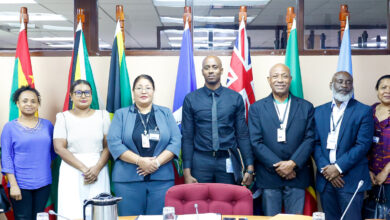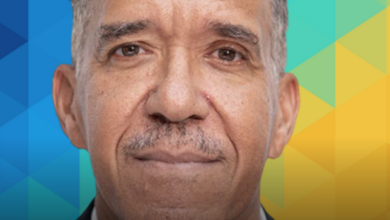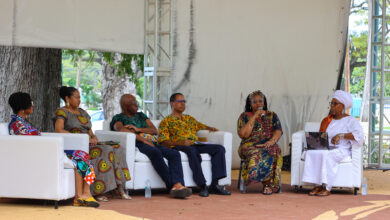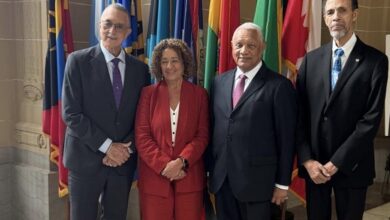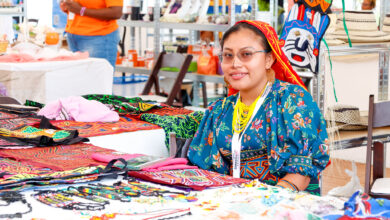Mr. Chairman, De. Edward Greene, Assistant Secretary-General, Human and Social Development, CARICOM
The Honourable John Fabien, Minister of Health, Dominica, and Chairman of the COHSOD
The Honourable Andrew Holness, Minister of Education, Jamaica
Other Distinguished Regional Ministers
Mr. Enel Brudson, Acting Custos of St. James
Professor Nigel Harris, Vice Chancellor, University of the West Indies (UWI)
Mr. Roger McLean, Senior Research Fellow and Health Economist, Centre for Health Economics, UWI, Trinidad and Tobago
Dr. Don Bundy, Representative of the World Bank
Representatives of the Consular Corps
Representatives of International Organisations
Delegates
Members of the Media
Ladies and Gentlemen
It is not often that I am afforded the opportunity to speak to such a gathering of distinguished regional minds on matters pertaining to the social infrastructure of the Caribbean Region. This, and the Ministerial Meeting of ECOSOC are taking place in the midst of two of the greatest challenges to the global social landscape.
I speak of the global recession and the H1N1 epidemic. Your theme, “Winds of Change: Education and Health collaborating to advance human and social development”, is therefore very appropriate and timely.
The cumulative effects of the multiple crises that we face include increased poverty and unemployment, reduction in remittances, a significant fall in private capital inflows, devaluation of currencies and high inflation. An additional 40 million people are expected to suffer from malnutrition. Global unemployment will increase by over 200 million and unemployment by fifty million.
While countries are struggling to stay afloat, the latest public health threat represents a set back for the global economy. Although it is still early days yet, the World Bank estimated in 2008 that a flu pandemic could cost US Three Trillion Dollars and result in almost a 5% drop in world gross domestic product (GDP).
We recall that the 2003 outbreak of severe acute respiratory syndrome (SARS) which lasted for just six months cost the Asia Pacific Region some $40 billion. It killed 775 of the 8,000 people it infected in 25 countries.
These grave threats to the Region provide two compelling reminders to us that we must not ignore.
One, the borderlessness of today’s world has increased our interdependence. Our size, wealth and geography matter less today as we face our common vulnerabilities in finance, public health and climate change.
Suddenly, old arguments and traditional stereotypes that have divided us as a Region, our language of prejudice and our discourse of differences are no longer relevant. We are confronted with a harsh but humbling reality: we are in the same boat.
Two, we must begin to view health as a resource of fundamental strategic importance to the survival of the Region. When placed within the context of a fundamental right, it becomes incumbent upon our governments to remove the impediments to access to health care.
Even as the Region positions itself to address the severe and wide-ranging impact of a global recession and the likely effect of the H1N1 virus, governments should invest more in those areas, such as health and education, that will give us a sustainable strategic advantage in an increasingly dynamic and competitive global marketplace.
I therefore challenge COHSOD to re-commit to one of its mandates, which is to promote the improvement of health including the development and organisation of efficient and affordable health services in the Community.
The way forward must include the development of pro-poor health and education policies, a gendered approach to policymaking and strategic regional leadership in health education and health information. Jamaica has taken a bold step in the social policy arena. Our no user fee policy in both health and education will radically change the social landscape of the country.
The government views health and education as the twin hope of the people that will prove, in the long term, to be the most important and life changing investment that is made in the development of the social capital of the country.
As a Region, we must seek the support of the international community to advance a pro-poor policy agenda in health and education as a fundamental pre-requisite for human and regional development.
There is room for the Region to organize itself to improve efficiency in evidence-based policy formulation, policy implementation, monitoring and evaluation and in the utilization of appropriate technologies to reduce cost and improve access to health and education.
The peoples of the Region are depending on us. COHSOD needs to secure the unrelenting commitment and actions of our political leaders in demolishing the social, political and economic constructs of the Region that keep our peoples in social, political and economic bondage.
It is time for us to re-define our terms of engagement with key sectors within the Community. The health and education sectors present the best opportunity to involve our peoples in decisions that will affect their lives and livelihoods. These sectors provide the best guarantee to reach, mobilize and influence a significant portion of our population to advance the Region’s social development.
As decision makers, we must be bothered by the increasing feminization of the HIV/AIDS epidemic, the marginalization of our males, the impact of violence on education and health and the rise in chronic non-communicable diseases.
For instance, Non-communicable diseases and injuries account for 69% of deaths and 65% of disability-adjusted life in the Region. Caribbean deaths from non-communicable diseases are ten times higher than HIV/AIDS related deaths.
I expect this and the ECOSOC meeting to deliberate on advancing specific strategies to implement the priorities that were articulated in the Port of Spain Declaration (2007) as they relate to the role of education in reducing HIV/AIDS. It is important that knowledge and skills pertaining to healthy lifestyles be entrenched in the syllabuses and assessments of all regional examinations.
Ladies and gentlemen, we do not have the luxury of time. The world, as we know it has changed dramatically in the past year, but in this Region, we are still united by a common hope of achieving human security for our peoples.
Ladies and gentlemen, the success of these deliberations will be judged by the progress that we make in securing the social capital of the Region for this and future generations.

